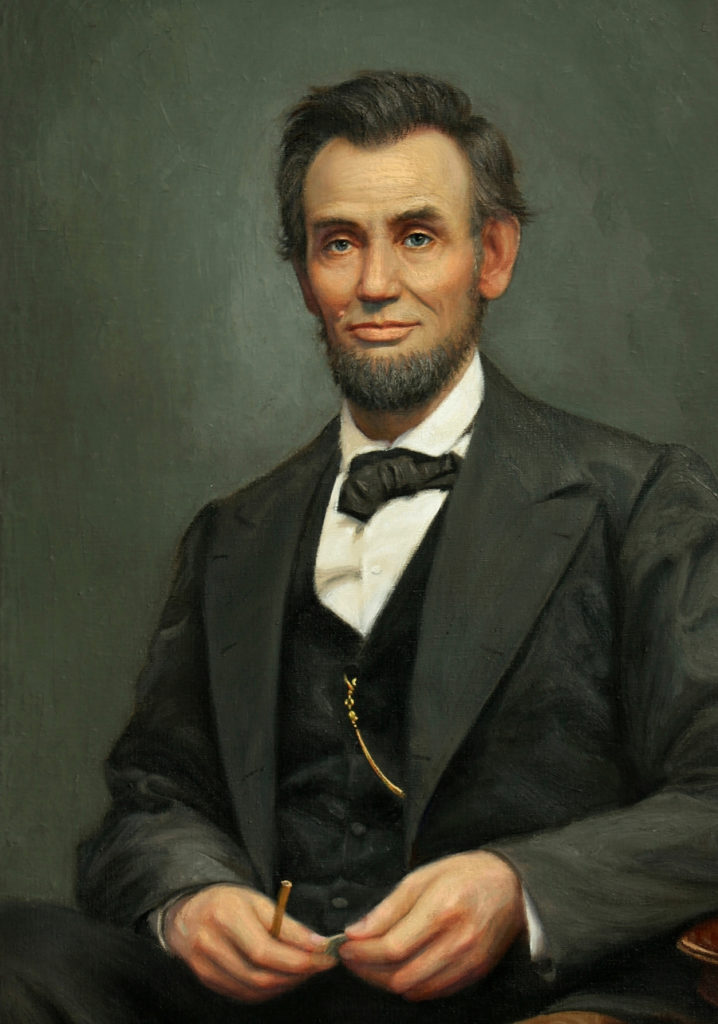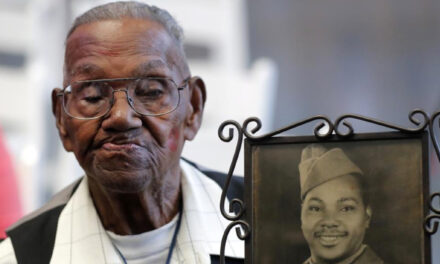By STEVEN SPEARIE
Springfield, IL (AP) – In an aptly named permanent exhibit of the Abraham Lincoln Presidential Museum called The Whispering Gallery, visitors are visually and audibly confronted with political cartoons and newspapers from the 1860s against the backdrop of a soundtrack critical of Lincoln’s ascendancy to the presidency.
Through the dark, crooked, unsettling hallway, visitors see and hear the attacks against Lincoln and his wife, Mary Todd Lincoln. The attacks are political and personal. Lincoln is portrayed as “a backwoods rube,” uncouth in his manners, and “a gorilla.”
There is one cartoon in the gallery that particularly grabs the attention of Christian McWhirter, a Lincoln historian with the Abraham Lincoln Presidential Library and Museum. From an 1863 edition of Southern Illustrated News, it depicts Lincoln pulling off a mask and revealing himself as the devil. The caption reads “King Abraham before and after issuing the Emancipation Proclamation.”
“This cartoon,” McWhirter said, “is a really great one for exploring opposition to Lincoln.”
If the public knows Lincoln as someone who is nearly universally revered and has surpassed George Washington among the country’s most admired presidents, The Whispering Gallery is a reminder it didn’t start out that way.
The nation’s contemporary divisiveness over Lincoln, whose birthday is marked on Wednesday, offer similarities to today’s political climate.
Like Lincoln, President Donald Trump has his supporters and detractors. And like the days of Lincoln, politics in 2020 are deeply divided.
If Lincoln was the target of scorn, he was also, historians insist, a model of virtue. The Abraham Lincoln Center for Character Development in the Lincoln Heritage Museum at Lincoln College promotes characteristics the 16th president exhibited _ honesty, leadership and humility, for instance _ that should be carried out in politics, in businesses and in schools, said Ron Keller, a Lincoln College history professor.
“Lincoln was both hated and revered in his time,” Keller said. But what stands out is his humility.
Just two days after Gen. Robert E. Lee surrendered his Army of Northern Virginia to Union Gen. Ulysses S. Grant at Appomattox Court House, and days before his assassination, Lincoln gave his final public speech at the White House. While many expected Lincoln to take a deserved victory lap, Keller said, Lincoln talked about the virtues of Reconstruction and deflected praise on the Union army.
Lincoln’s ascent to among those considered great Americans began shortly after his assassination in 1865. His martyrdom, and the outpouring of grief that accompanied it all the way back to Springfield, was something “America has never really had before,” McWhirter said.
While the root cause of the Civil War was the debate over slavery and its extension west, McWhirter said the impetus for the South to secede was Lincoln’s election.
“They would rather leave the United States and form their own country rather than live in a country with Lincoln as president,” McWhirter said. “You don’t get much more controversial as an American president than that.”
Michael Burlingame, a Naomi B. Lynn Distinguished Chair in Lincoln Studies at University of Illinois Springfield, said Lincoln was so little thought of it was an assumption Secretary of State William Seward, a more polished politician, “would be the real president and Lincoln would kiss babies and cut ribbons and be the ceremonial president.” Lincoln “very firmly and gently put (Seward) in his place,” Burlingame said.
Even Lincoln’s secretary of the Treasury, Salmon Chase, tried to steal the Republican presidential nomination of 1864 from him, Burlingame said. Lincoln’s answer? He appointed Chase the chief justice of the U.S. Supreme Court.
“It was a testimony,” Burlingame said, “to Lincoln’s magnanimity and his unwillingness to bear grudges.”
With Lincoln’s assassination, “the divisions immediately melt away,” McWhirter said. Some white Southerners especially were horrified by the assassination because they thought Lincoln “would be fair in Reconstruction. There’s deep irony there.”
There are lessons to be learned from Lincoln, Keller said. One of those qualities the Abraham Lincoln Center for Character Development promotes is leadership.
“The fact is,” Keller said, ”(President Donald Trump) seems to delight in dividing and conquering and hitting back. That’s not leadership. It delights your supporters. It elevates hatred, but doesn’t elevate the discourse.
“Lincoln said to Southerners, `I don’t hate you.’ He tried to understand what Southerners believed. You don’t need to ostracize your opponent. That’s the lowbrow, getting in the mud.
“It doesn’t show leadership to tear up a president’s speech (like Speaker of the House Nancy Pelosi did last week). It does nothing to show you care about civil discourse.”
While he decries the behavior of Trump and Pelosi, Keller said both might benefit from taking a page from Lincoln.
“These attributes (of Lincoln) are simple,” Keller said. “You just have to practice them.
“Lincoln wasn’t born with these qualities. He was a politician, there’s no doubting that, but he was also a statesman. A politician is one who constantly thinks about the next election. A statesman is one who constantly thinks about the next generation.”
Abraham Lincoln, 16th US President









